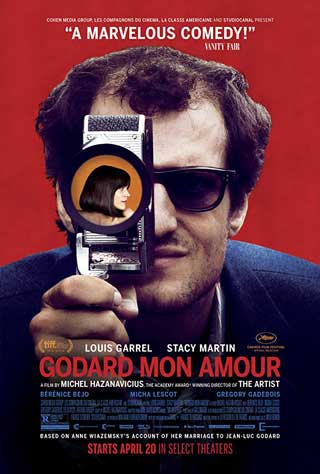Film (2018)
Written and directed by Michel Hazanavicius
Based on the novel Un an après by Anne Wiazemsky
Cinematography by Guillaume Schiffman; Film Editing by Anne-Sophie Bion, Michel Hazanavicius; Casting by Stéphane Touitou
Kendall Square Cinema
Cambridge, MA
With Louis Garrel (Jean-Luc Godard), Stacy Martin (Anne Wiazemsky), Bérénice Bejo (Michèle Rosier)

Jean-Luc Godard, considered one of France’s leading film directors, made his reputation early on with such classics as Breathless (1960), Pierrot le fou (1965) and Masculin, féminin (1966). As he began to become influenced and in many ways swept away by radical politics of the Maoist variety, those elements began to seep into such films as La Chinoise (1967) and Week End (1968).
After that, as this very interestingly constructed biopic demonstrates, he was off and running with politics, putting it, in many ways, over and above his aesthetics of film-making, and hamstrung between the two poles of himself. As well, his second marriage, a passionate May-September romance with Anne Wiazemsky who provides the narrative here, erodes.
Michel Hazanavicius, who directed the wonderfully bizarre and beautifully done The Artist (2011), brings his own special brand of whimsical veneration to the complex subject of Godard. Though revered in so many ways as the brilliant creator of many of the film classics that emerged from France in the early 1960s, Godard also became, in connection with what emerged as a rigid ideological stance, a difficult and intractable personality.
Director Hazanavicius’ choice to make this a comedy is a brilliant one. Offsetting and contrasting with Godard’s extremely heavy sense of mission, this fun and wild script somehow manages to pay homage to the cinematic master while winking and smiling at his ideological rigidities.
The story is adapted from Anne Wiazemsky’s memoir of her relatively short marriage with Godard. When they got together, Anne, granddaughter of the celebrated French man of letters François Mauriac, was very young, still a teenager; Godard was in his late thirties. As time went on, the special and passionate love affair turned sour, not only affected by Godard’s stiffness about Maoism but by his unrelenting jealousy.
The film script is cleverly divided into chapters with such titles as Wolfgang Amadeus Godard and Everything is Brighter With Mao and fills in the narrative with bons mots like Anne loved Jean-Luc but he talked too much. The result is a sweet and funny mix, with a dose of history and a taste of whimsy.
Though Godard is satirized through much of the film, the portrayal is also gently empathetic. Frustrated with his public persona as a celebrity and his inability to reconcile the political and artistic sides of himself, Godard here says I’m just an actor playing Godard and not a particularly good actor. It’s a poignant and telling reflection.
The three principals are all very good.
As Godard, Louis Garrel is both a pain-in-the-ass and strangely sympathetic. One can perceive, through his and writer-director Hazanavicius’ handling of the role, how Godard was indeed great, and also greatly compromised by his personality and ideological insistence.
As Anne, Stacy Martin is captivating and persuasive, both adoring of her celebrity husband and self-possessed in her own gently understated way. Martin was the compelling star of Lars von Triers’ provocative 2013 film Nyphomaniac, Part I and she is every bit as compelling, and a bit older and wiser, in this role.
Bérénice Bejo, as Godard’s and Anne’s friend Michèle Rosier, is a forceful and magnetic presence. She was at the core of Hazanavicius’ The Artist and she makes considerable hay in a riveting supporting role here.
Overall: A light and fun, persuasive and compelling, treatment of the celebrated French director, well worth seeing.
-BADMan
Leave a Reply